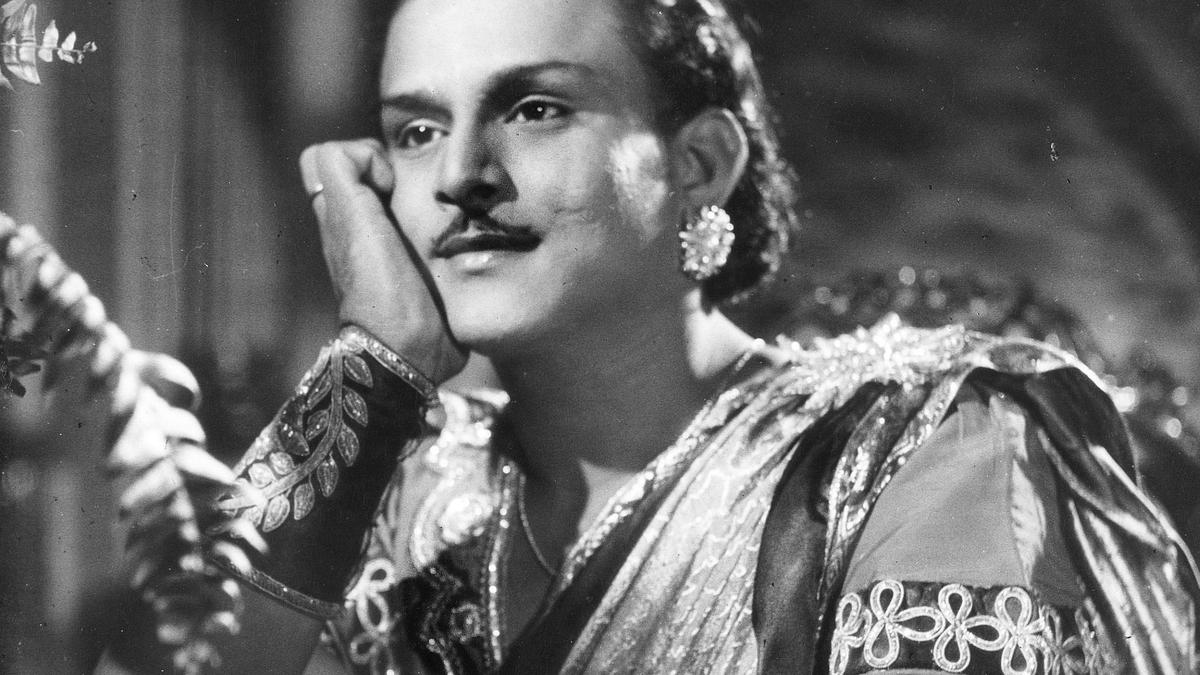
In his birth centenary year, tracing T.R. Mahalingam’s rise to stardom in Tamil cinema
The Hindu
Meet the yesteryear superstar
Thenkarai Ramakrishna Mahalingam (TRM) was already a singing sensation on stage, when A.V. Meyyappa Chettiar cast him in the role of Krishna in the film Nandakumar, released in 1938, when TRM was only 14.
TRM’s first box office hit was Meyyappa Chettiar’s Sri Valli, released in 1945. S.G. Kittappa, whom TRM admired, had popularised Kavi Kunjara Bharati’s Ellorayum polave (raga Suddha Saveri) TRM sang it in Sri Valli. Like Kittappa, TRM sang at a sruti of anju kattai (G scale).
TRM’s next hit in 1947 was Naam Iruvar, also produced by Meiyyappa Chettiar. TRM played the role of Sukumar, the hero. His son was born while the film was being shot, and was named Sukumar. In 1948, TRM and AVM teamed up again for Vedala Ulagam, translated faithfully as ‘Demon land’, even in the 78 rpm record labels. It was a fantasy film that drew both children and adults in droves. Comedian Sarangapani’s line “Idliyaare vaanga, vayathukkulla ponga”, became a kind of refrain in many homes, when idli was served.
TRM sang Bharati’s ‘Senthamizh nadenum podinile’ as the title song. In the TRM song ‘Maha sugitha roopa sundari’, the hero serenades the heroine Rajeevi ( actress Mangalam). Interestingly, this tune was used in the Ilaiyaraja song ‘Madana moha roopa sundari’ sung by Malaysia Vasudevan in the film Indru Poi Naalai Vaa. In the same year in Modern theatres’ Adithan Kanavu, TRM sang ‘Maduramaana ruchi ulladhe’, which was popularly known as the ‘palgova’ song.
TRM soon became wealthy, and built a huge house in Royapettah High Road, which he named Sukumar Bhavanam. TRM owned 17 cars! Every time a new car arrived in India, he would buy it from TVS, who were dealers for imported vehicles then. Along with the car would come a scale model car for his son Sukumar to play with. Unfortunately, when things were going well for TRM, he ventured into film production, and incurred debts. But his luck turned for the better, when Kannadasan offered him the hero’s role in his film Malaiyitta Mangai, in 1958. Kannadasan’s son Gandhi says, “My father’s script was based on a story by Sarat Chandra Chatterjee. He wrote 17 songs for the film. Father ignored warnings that the film wouldn’t do well because Mahalingam was no longer in the limelight. Father paid him liberally, helping him settle his debts.”
“Kannadasan gifted thatha one of his imported cars,” says Prabha, TRM’s granddaughter.
Kannadasan was so impressed with the Rafi song ‘Muhabbat choome jinke haath’ (film Aan; music Naushad), that he wrote a song in the same metre. MSV and TKR gave the first line a tune similar to the first line of the original. That song is the famous ‘Sentamizh thenmozhiyaal’ in Malaiyitta Mangai. The film was shot in just 39 days. It was released in Paragon theatre, and ran for 91 days. When Kannadasan’s friends suggested that he should keep it going for another nine days to reach the prestigious 100-day mark, he refused, and said that a film should run on its own steam, and should not be pushed towards pre-set goals. The film helped TRM bounce back and regain prosperity.

More than 2.6 lakh village and ward volunteers in Andhra Pradesh, once celebrated as the government’s grassroots champions for their crucial role in implementing welfare schemes, are now in a dilemma after learning that their tenure has not been renewed after August 2023 even though they have been paid honoraria till June 2024. Disowned by both YSRCP, which was in power when they were appointed, and the current ruling TDP, which made a poll promise to double their pay, these former volunteers are ruing the day they signed up for the role which they don’t know if even still exists

















